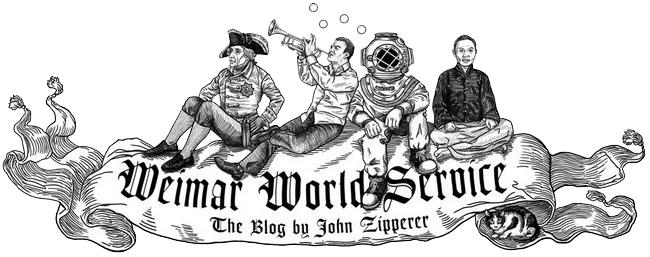Wednesday, April 4, 2012
All for One, and One for One
Once in a while, just a few minutes on the radio encapsulates some very telling features of our culture.
This morning, National Public Radio's Morning Edition carried a report about Germany's ancient tradition of apprenticeships, after first noting that youth (well, people under 25) unemployment in countries like Spain is around 50 percent while Germany has the lowest youth unemployment rate in Europe.
The successful German approach is a partnership between big businesses and labor unions that provides on-the-job and vocational training to a huge portion of the country's population. Something like 60 percent of high school graduates go into this system, rather than higher academia. They receive about a third of the pay of a starting wage for a full-time worker. The reporter interviewed a young aircraft mechanical technician, Robin Dittmar, who was working as an apprentice with Lufthansa. He splits his time between on-the-job training, actual on-the-job work on engines, and off-site vocational training. Ninety percent of apprentices complete their apprenticeships, and 50 percent of those are hired by the companies for which they apprenticed; the remainder presumably finding work with other employers in the same field or switching jobs/careers.
Right after that report, Morning Edition carried a story from Illinois about a young man who was recently named one of four Lego Master Model Builders. Like Robin Dittmar, Andrew Johnson had a long-time passion and obsession with Legos, and like the German aircraft mechanic, he is turning it into a full-time job. Unlike the German aircraft mechanic, there are only three other people who do what he does, and it's not, let's admit it, the most useful work to perform.
Let's not begrudge him his success; he's got a dream job, one that lots of people – Lego enthusiasts, at least – would love to have. But it was an illustration, certainly unintentional, of American attitudes versus at least one other country's attitudes. Americans love to hear about the one person who hit the jackpot, won the lotto, sold her dot-com for billions, won American Idol, earned $100 million in a business deal, and so on.
Germans like their high-achievers, too. There's even a German edition of American Idol. But their system itself isn't an American Idol or casino system; it's set up to try to be as useful for as many people as possible.
Now, America (or other countries) shouldn't just copy the German apprenticeship model. Shouldn't and couldn't. Germany has a situation in which its labor and business groups made lasting (and profitable) peace after World War II by agreeing to a consensus model of decision-making. There's no way that would be widely accepted in the United States, and that's not even taking into account the impending extinction of U.S. labor unions.
However, America and other nations should be considering approaches that address the needs of the majority of its population, not a casino approach with near-impossible odds but a small number of jackpot winners. It might be less razzle-dazzle, and more practical, but that's economics for you.
Subscribe to:
Post Comments (Atom)


No comments:
Post a Comment